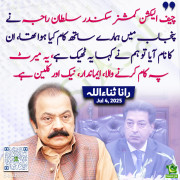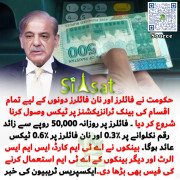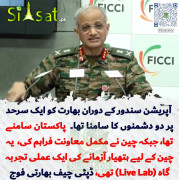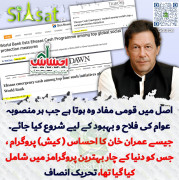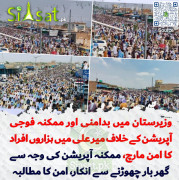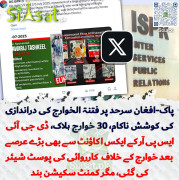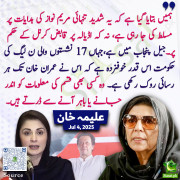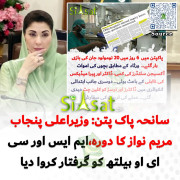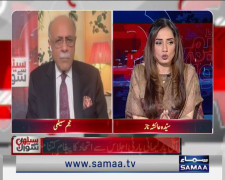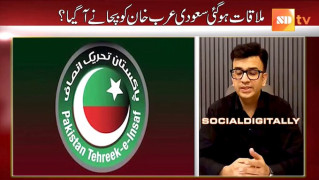mehwish_ali
Chief Minister (5k+ posts)
کیا قوم نے کبھی سوچا :۔
کیوں عمران خان کو وہی پرانے کرپٹ جعلی ڈگریوں والے وڈیروں اور زمینداروں کو اپنی پارٹی میں شامل کرنا پڑ رہا ہے؟
اس میں عمران خان کا قصور کم اور ہمارے "پارلیمانی" سسٹم کا قصور زیادہ ہے۔
مشرف صاحب کو بھی اسی وجہ سے "قاف" لیگ کے لوٹوں پر انحصار کرنا پڑا تھا۔
اگر قوم چاہتی ہے کہ ہمارے لیڈران اس فتنے سے بچیں تو انہیں بہت سنجیدگی سے ملک خداداد پاکستان کے لیے "صدارتی جمہوری نظام" کی سٹڈی کرنا ہو گی۔
صدارتی جمہوری نظام وہ واحد آپشن ہے جو کہ پاکستان کو ان وڈیروں کی سیاست سے نجات دلا سکتا ہے۔
اس لیے تمام محبانِ وطن کو دعوت ہے کہ وہ اس کیس کی سٹڈی کریں اور اپنی آراء سے آگاہ فرمائیں۔

کیوں عمران خان کو وہی پرانے کرپٹ جعلی ڈگریوں والے وڈیروں اور زمینداروں کو اپنی پارٹی میں شامل کرنا پڑ رہا ہے؟
اس میں عمران خان کا قصور کم اور ہمارے "پارلیمانی" سسٹم کا قصور زیادہ ہے۔
مشرف صاحب کو بھی اسی وجہ سے "قاف" لیگ کے لوٹوں پر انحصار کرنا پڑا تھا۔
اگر قوم چاہتی ہے کہ ہمارے لیڈران اس فتنے سے بچیں تو انہیں بہت سنجیدگی سے ملک خداداد پاکستان کے لیے "صدارتی جمہوری نظام" کی سٹڈی کرنا ہو گی۔
صدارتی جمہوری نظام وہ واحد آپشن ہے جو کہ پاکستان کو ان وڈیروں کی سیاست سے نجات دلا سکتا ہے۔
اس لیے تمام محبانِ وطن کو دعوت ہے کہ وہ اس کیس کی سٹڈی کریں اور اپنی آراء سے آگاہ فرمائیں۔

We have Parliamentarian System in Pakistan. The situation in Pakistan make Parliamentarian System as a very bad choice for Pakistan.
The Parliamentarian system is fully BASED upon the MPs (members of parliament) who are elected. They not only do the legislation, but also the "Government-Making". After that these same MPs become "Ministers" and run the government.
In case of Pakistan, the very BASE of this Parliamentarian system (i.e. MPs) is corrupt. The Wadayrahs have enough power to hijack small areas of their constituencies by using Ghundas (Mafias) and showing muscles power and corruption or by using the Baradari card etc.
Today Pakistani People are fed up with present system, and they are confused. Some times they start looking at Military and some times they start looking at Judiciary to bring the revolution.
Even the new parties will also be forced use these same corrupt Jageerdars in order to win the elections (as we saw in the by-elections) where newly formed party of Imran Khan was giving tickets to same old corrupt Political lotas.
Only due to this failure of Parliamentarian System, we are hearing the voices among masses for Dictatorship and Army or Supreme Court.
Any how, there is still one way left … there is still one alternative left i.e. Presidential System.
Sadly, the intellectuals, columnists and leaders of our Nation, they have not concentrated enough upon this alternative of Presidential System and although we hear few voices here and there about Presidential System, but still there is no good and serious study made about it according to the present situation of Pakistan.
It is irrelevant if Nation adopts this new Presidential System or not, but still there should be serious study upon it and we have to look at positives and negatives of this system. If we today talk about it and make nation aware of it, only then we could hope that Nation could adopt it in next 5-10 years.
How does the Presidential System works
In Parliamentarian system, the AWAM (public) get only ONE chance to go to the ballot box and choose the member for national assembly. Then those MPs (members of Parliament) choose the Prime Minister. Then this Prime Minister chooses the Ministers from those same Corrupt Wadayrahs type MPs (440 in total in Pakistan, while only 150-200 belonging to the ruling party).
But in Presidential system, the importance of AWAM (people) increases as it gets TWO Chances to go to ballot box. Firstly in order to choose the members for Parliament. And secondly, when this AWAM (people) choose the President DIRECTLY. And then this directly elected President forms the government. President choose the ministers from all over the country and the best Talented people of their specific fields are chosen as Ministers (not that educational minister is Metric fail as happens in present Parliamentarian system of Pakistan).
This President is free of blackmailing of different small Parties and independent candidates in Parliament while AWAM choose him directly.
Why Presidential System is better for Pakistan than Parliamentarian System?
1. Jageerdarana/Wadayra System
In Parliamentarian system, every constituency becomes very importance. Every member of parliament not only does the “Legislation”, but also he is involved in “Government-Making” and then further Cabinet Ministers are also formed from these same MPs who have then full control of resources of the country.
In Pakistan, the Baradari system or Wadayra system are strong enough to get hold of small areas like one constituency, and get success there by unfair means. While a normal Pakistani, who is perhaps much more educated and loyal to Pakistan than that Wadayra, he has got absolutely no chance to win against these corrupt but powerful Wadayras.
In comparison to Parliamentarian system, the role of MPs is not so important in Presidential system and they are not strong to do the corruption. Their role is limited only to doing “Legislation” for the country and they are no more involved in “Government-Making” or they will not become "Ministers" and thus could not do big size corruption.
So, this Presidential system snatch the power of “Government-Making” and "Ministry" from these wadayras, and give it to the whole Nation so that they could Directly elect the President themselves.
Therefore, even if there come no Land reforms in Pakistan, or we don't crush this Wadayra system, still we would be able to destroy the importance of this wadayra system by making it ineffective and powerless. Even if the results are not 100% (as in case of crushing them from root), still success rate will be much higher than in the present Parliamentarian system.
[Note: Wadaras have transferred their lands further to their relatives and there are very minute chances that any kind of land reforms could crush them successfully.]
2. The decrease in importance of Provincial Assemblies after introduction of Local Body System
Do you remember when the Local Body system was introduced and the Powers were transferred to the local Body system, then these wadayra and Jageerdars were not interested any more in becoming members of Provincial assemblies. In fact, many members of Provincial assemblies resigned from their seats and contested for the Local body elections.
Therefore, we could hope that we will witness the same thing in national assembly after the introduction of Presidential system when members will lose the right of “Government-Making” and there powers will be limited only to doing legislation. Therefore, at that time these seats of national assembly will be no more interesting for these corrupt Wadayras and Jagirdars while in Presidential system they are no more a duck which lays golden eggs. After that, only those people will contest for national assembly, who are serious and loyal in doing legislation for their country.
3. Cabinet Ministers are chosen only from the MPs in Parliamentarian system
One of the biggest flaw in Parliamentarian system is this that Cabinet Ministers could only be chosen from among the Mps (who are mostly illiterate, corrupt, incompetent and have become MP due to Wadayra power, or Baradari power).
In case of Pakistan, the prime minister has to chose the whole cabinet from 342 members of NA (and perhaps 100 more of Senate). Actually, these figure are also not true, while prime minister choose the ministers ONLY from his party which reduce this number to 150-200 members normally.
Under the Presidential system, on the other hand, the President is not hampered by such considerations. He is not tied to, or subordinate to, the legislature. He is free to choose his cabinet of ministers from outside the members of the legislature. In this way, he can induct really competent, experienced and deserving people into the government. He can choose freely men of vision and integrity, of professional knowledge and practical experience.
4. Political Families and inheriting politics as business
In Pakistan, there are few Political Families and they inherit the politics to their family members as business. For example:
1. The brother of Nawaz Sharif. The son-in-law of Nawaz Sharif … and then other relatives like Abid Sher Ali, Bilal Yasin etc.
2. Chaudhry Shujaat and his family.
3. Asif Ali Zardari, his sisters and in future his son Bilawal.
Etc.
In comparison to Parliamentarian system, when the right of “Government-Making” and "Ministries" will be shifted to the AWAM (public) directly, then this will also reduce this Family Politics system too (or at least reduce it's importance to great extent). Thus, it would not harm Pakistan too much as it is doing in Parliamentarian system at present.
5. The special quota seats for the women
In Parliamentarian system these women (who come on these special quota seats),they also participate in this “Government-Making” process and also become the ministers. Therefore their importance also increases many folds. Hence you will see that wives, sisters and daughters of big Politicians and Families and corrupt Wadayras sitting upon these special quota seats. They are absolutely not interested in legislation for women, but more interested in “Government-Making”.
In Presidential system, this culture will come to an end as the role of these special quota seats will be limited only to legislation.
6. Lotacrary (Horse Trading)
This Lotacrary is only the gift of Parliamentarian system, while in Presidential system there is no place for lotacrary.
This lotacrary comes into being when one party has not got the decisive majority in the parliament and is unable to form the Government at it's own. Therefore, small parties and independent members become Lotas and they have then a price tag for their vote.
This lotacracy does not limited only to one time Government forming. No, during whole tenure of such government, they keep on blackmailing the government and doing corruption at their will, while Government has to stay quite upon their blackmailing.
In presidential system, while it is AWAM which chooses the President directly, therefore such President is fully free of any type of blackmailing of such small parties and lotas. The president has public support at his back thus making him independent of these lotas.
In Parliamentarian system, you will see big army of Ministers in cabinet while small parties and lotas demand their share in form of ministries. For example we have almost 90 Ministers in present government of Pakistan. Another example is of JUI (Fazlur Rehman Group) which has 7 seats in national assembly, but almost 6 ministries in the cabinet.
In Presidential system, once again we witness small number of ministers as small parties are unable to blackmail the President.
7. The presence of more small parties is not good for Parliamentarian System
Unfortunately:
1. We have MANY small parties and groups and independent candidates in our national assembly of Pakistan. The Parliamentarian system works best when there are only 2 or 3 big parties present in the parliament, otherwise these small parties start playing lotacrary.
2. Second unfortunate thing for Pakistan is this that none of these Political Parties has the decisive majority seats. At end, they have to become victim of blackmailing of small parties.
3. Third unfortunate thing is this that all of these parties are limited to some specific areas of Pakistan. This is not a good sign for democracy or Parliamentarian system.
Due to these three problems, again Parliamentarian system is not good for Pakistan.
8. Usage of Ghunda (Mafias) in Parliamentarian system to get votes
In Pakistan/India, the Ghunda (Mafias) are used to bring the voters to caste their votes. They are also bribed with Money and with food.
In presidential system, Wadayrahs have very less Personal Interests. These corrupt Wadayrahs are not loyal to Pakistan and also not to their Parties, but only and only to their "own interests". In presidential system, even if their party candidate becomes the President, still these wadayrahs could not blackmail their parties by becoming Lotas as they don't have any right for "Government Making". Then these Wadayrahs are also not going to become the Ministers (even if their Party Candidate wins) while they don't have enough Educational background to compete with the real Professionals of that field.
Due to these reasons, the usage of Ghundas and Mafias is much much less in presidential elections as compared to parliamentarian system (while Baradari Card is totally discarded in Presidential system).
In Presidential system only those people come out to vote who are really close to any candidate politically and ideologically i.e. No fake vote in name of money, food or force.
During last Presidential Elections in Iran, then turn out was unbelievably high (i.e. 90 %). All that happened only due to the Ideological point of view and people came out at their own. In Pakistan people think there is no value of their vote while at end Wadayrah is going to win the race at every cost. Therefore turn out is very low in elections.
9. The wastage of Votes in Parliamentarian System (True WILL of Majority of Public could not be determined)
A big number of votes are wasted in Parliamentarian system and True Leader of Nation (with real majority) does not come to the office. Let us make it clear how it effects the nation.
Suppose, there are Many Parties/Groups in a Country. During elections of MPs, the votes of all candidates of other parties are wasted and only one Candidate is chosen even if he has got only 25% votes, while all other candidates have collectively got the rest 75% votes. In this case this 75% votes are wasted in one way or another.
In Presidential system, the winning candidate could Only become President if he has got over 50% votes . But if he has got less than 50% votes, then he could not become president even if he wins the race. In this case the competition goes to 2nd round where 1st and 2nd number candidates compete with each other. Here comes the real leadership.
The best example is of President Elections of Iran in 2005. Just watch how this system makes the difference.

As you can see that:
1. In first round of Presidential Election (2005), there were 7 presidential candidates. Every group gave vote to it's favourite candidate and thus votes got distributed among them.
2. In this first round Ahmadinejad got only 19% votes and came 2nd. While Rafsanjani got 21% votes and stood 1st. But over all Iranian public didn't like Rafsanjani and his group, as they presented the Rich Mullah group, who got control of much of the resources of Iran and they were blamed for corruption.
3. In 2nd round of Elections, all these remaining groups got together behind Ahmadinejad and he made a long jump and got huge 61% votes (huge jump from 19% to 61%). While Rafsanjani got only 35% votes in total.
Thus, this 2nd round of Presidential Elections gave the Real Leadership to Iranian people, a leadership which was backed by 61%. Thus, no wastage of votes took place as it is the case in 1st Round of Presidential Elections.
The Objections made upon the Presidential System
1. We need “Sincere“ people, and not the "New System“
The first, and the most common objection is: "We don't need a NEW system, but we need the "sincere" people who "implement" the system."
It sounds good, but in practical world, a sincere person is also some times helpless at hands of corrupt system and unable to do any thing.
For example, Supreme Court wants to crush the prices of sugar, but it didn't get any success under present Parliamentarian system while all Mill owners are themselves sitting in the cabinet and they could blackmail the government very very well.
Musharraf's era of 1999 till 2002 was best when without taking any US aid, he was able to strengthen the economy of Pakistan. Nawaz Government left only 0.30 Billion US Dollars and country was very close to be declared as Bank Corrupt. But Musharraf was able to increase the foreign exchange to 3 Billion dollar (from 0.30 Billions) without any US aid. But then Musharraf had also to take the support of corrupt politicians of Q-League in order to run this parliamentarian system.
We saw that Imran's party gets no seats in the parliament. And finally he is giving tickets to the same old corrupt political Lotas in by-elections, while these Lotas have more chances to be successful in the elections due to their Baradari or other corrupt reasons.
MQM is free of these corrupt Wadayrahs up till now, but when they will go to the rural areas (from Urban ones) then they also have to shake hands with Wadayrahs in order to get any success.
Therefore, your intention may be very pure, you may be very sincere, but after taking the "Wrong Decision", the chances of success are very minute. And this parliamentarian system is indeed that "Wrong Decision" in history of Pakistan which is harming the country for decades and every time same corrupt politicians coming to power again and again.
Allama Iqbal said about these same people:
آئین نو سے ڈرنا، طرز کہن پر اڑنا
منزل یہی کٹھن ہے قوموں کی زندگی میں
Iqbal says: "The most difficult step in life of a Nation is to take the NEW Steps. They are afraid of taking new steps, therefore they keep on sticking to the same old corrupt system."
Very truly said Sir Iqbal.
2. India is running the Parliamentarian system with success
This is the first objection which we hear from the opponents of Presidential system.
We request all readers to please study this Article (link). After this you would realize that India is absolute not successful due to this Parliamentarian system and there are all evils present in Indian Parliamentarian system that we are facing in Pakistani Parliamentarian system. The Indians still realize that people sitting in their Parliament are very “Powerful” people, and their main interest is “Government-Making” and not the legislation. Thus we witness every kind of lotacrary and horse trading in Indian parliament. And we also witness the corrupt and most illiterate type of people are sitting in Indian assemblies.
At end, parliamentarian system is successful where whole nation is educated one, where there is no Baradari system, no corrupt and powerful Landlords who become even above the law due to their corrupt political powers.
Without these prerequisites, this parliamentarian system become very fatal for the nation.
We request all readers to please read this article about India. It is very interesting and we could learn a lot from it.
Please note, India went for Land Reforms and contrary to Pakistan, there is not such big problem of Wadayras or Jagirdars present in India as we have in Pakistan. But still Parliamentarian system brought some of the most corrupt Indian Politicians in the parliament, who base their politics upon Baradari system etc.
Please read the above mentioned article where Indian Intellectuals themselves cursing this Parliamentarian system while Political Parties started giving seats even to the CRIMINALs with enough Muscle Power and thus they could bring more and more seats to them.
It is strange that after so many years of parliamentarian system, the Indian Intellectuals want to transfer to Presidential system, but we are crying for India as being role model for us(link).
2. In some countries, Presidential system converted into Dictatorship
Studies have been done upon Presidential system, and the biggest objection upon it is this that in few African and South American countries, the Presidential system converted into dictatorship.
It is a valid objection.
Nevertheless, in “Pakistan of Today”, there is 0% chance that “Republican Presidential System” changes into any kind of dictatorship. These examples of African and South American countries are old, when there was no independent Media available and people didn't have enough awareness. But today we are watching a Media Revolution, especially in form of internet and mobiles. Today it is almost impossible.
Please note, Gen (rtd.) Musharraf was a “Military President”, but still it was not possible for him to become real dictator in today's Pakistan. While we are talking here about “Republican President” today.
In comparison to “Military President”, there are many checks upon “Republican President”. Assemblies not only work as opposition, but they are also check upon the President. We don't go in details in this short article, but briefly, if needed, we could introduce more checks according to circumstances of Pakistan.
3. Small Provinces could object upon Presidential System
The opponents also say that small provinces will protest that presidential candidate from Punjab would be able to get more votes why Punjab population is in majority.
This objection is not true. This allegation is already there in present Parliamentarian system while seats from Punjab are already in almost decisive number in Parliament. It is reality that Punjab makes almost half of Pakistan population and this reality could not be changed. Now what ever route you take, you come to the same result.
And we could also apply formulas, which could equate the Effects of total number of total votes from every Province in presidential system to the number of seats in present parliamentarian system from every Province. In every way, this problem is solvable.
In fact, present parliamentarian system is becoming a reason for provincial hatred. For example:
- Awami National Party of Mujeeb-ur-Rehman got the label of East Pakistan.
- Nawaz League got the label of representing only Punjab.
- MQM got the label of Karachi and Hyderabad.
- MMA got the label of Baluchistan and Khyber Pakhtunkhawa.
- And PPP has got the label of Sindh.
Therefore, the net system will be the same. Actually, there are chances of better results in Presidential System as individual Presidential Candidates could more free of these provincial tags as it is the case with present Political parties of Pakistan.
Also, the parliamentarian system has only one answer to this problem i.e. they name their Prime Minister from small province. But this is also true for Presidential system and the big Political Parties could name their Presidential Candidates from small provinces too(e.g. if Nawaz League nominates any Sindhi as it's presidential candidate). So, parliamentarian system has absolutely no advantage over presidential system in this regard.
Another advantage of Presidential System is this that President could choose the ministers from every small provinces. But in Parliamentarian system, it could become a problem. For example, if Nawaz league has to form a government, but it has no MPs from Sindh and Baluchistan, then how they are going to choose Ministers from small provinces?
Do you remember the problem of East Pakistan and West Pakistan? Awami league got all the seats in East, while PPP got all the seats from west. The result was breakage of Pakistan under that parliamentarian system. How could then these opponents still claim that parliamentarian system is better for Federation than presidential system? US is a big big country and federation of many small states, and presidential system is working excellently there.
4. How could a poor person run for Presidential Elections through out the country?
The opponents claim:
- Presidential system is only for rich, who could campaign in whole country.
- They also ask question what would you do if 100s of candidates rise to contest in Presidential Elections?
These opponents are Idealist. While no system is fully Ideal.
These opponents are talking about EXTREME situations, which rarely happen in real world. Presidential System is working in many countries of the world and in practical world, no 100 Candidates ever contested for the it.
It is almost impossible that fully unknown person comes forward for Presidential elections. How could AWAM (public) judge such a person if he could be a true leader or not?
Normally only those people come as candidates, who have long Journey to success in different departments. And people recognize their potentials and know that they have already delivered and thus could also deliver as President.
Dr. Ata delivered as Educationalist and running the Chemical Institute in Karachi and nation already know him.
Dr. Qadeer Khan delivered as Hero for Atomic program and nation already know him.
Imran Khan has a party now. But even without party nation knows his abilities and he has support among masses.
People also know Mustafa Kamal that he has the potential to deliver.
Lesson is this that before becoming Presidential candidate, one has to go through long journey of hard work. It is impossible that totally new face, who has no achievements, he comes forward and try to become President. Although theoretically possible, but it does not happen in the real world.
Since such famous Personalities (like Imran, Dr. Qadeer, Mustafa Kamal etc.) already very famous among the nation, thus they have also support. And either party backing or not, but still their campaign is run by their supporters all over the country, people already know their agendas, they know them through electronic media. Thus such successful person could be poor, but still he could run for the Presidencial elections.
While 2nd option is still open i.e. any Political party make such Poor but talented person their Presidential Candidate.
At this moment, we should take the example of Ahmadinejad of Iran. He is a poor person. But people knew him for his services as Tehran Mayor. Thus people were already there who supported him why they knew how honest he is and how simple he is. Then a small party also came to support him. Final result was this that he won the Presidential elections. In Parliamentarian system, that small party had got no chance to make Ahmadinejaad the head of state, and such wonders could only happen in Presidential system.
These same thing happens all over the world where Presidential elections take place. In real world, this system is indeed working.
5. How will the result be any different if one party is as popular as PPP or PML(in 90s)?
These parties are not as popular as it seems to be in first sight. If these Parties don't give Tickets to Wadayrahs, but to normal Pakistanies, then they will get very less numbers of votes. They don't get vote for their Good Agenda or Revolutionary Ideas, or Excellent Performance ...., but they get votes while they have a "Huge Network" of corruption, which is Wadayrahs based. In presidential Elections, this "Network" becomes ineffective as Public (Awam) has to vote for the Presidential Candidate directly.
6. What if either PPP or Nawaz league candidate once again become President?
Even in this case, still the government is much better as compared to Parliamentarian system.
1. Look, even PPP or Nawaz league are not able to get the decisive vote. There are lot of small parties and independent Lotas who blackmail them in order to form the government.
2. The Public directly chosen President, even from these 2 parties, will be much more immune to blackmailing of it's own MPs. He will be free to choose the Ministers from all over Pakistan, the most competent and intelligent and professional ones. He would not be blackmailed to choose only from 150-200 corrupt MPs of his party.
It is a win win situation if we go for Presidential system. The evils perhaps may not be removed 100%, but their impact will be reduced one.
And it is not necessary that 1st and 2nd Candidates always come from PPP and PML (N). Neither Zardari nor Nawaz Sharif nor Chaudhry Shujaat have any personal Charisma or competence as compared to Musharraf, Imran Khan or Mustafa Kamal. There is a possibility that one of this new face make a break through in 1st or 2nd position (at least chances are much brighter than present Parliamentarian system).
Conclusion:
According to present circumstances of Pakistan, the Presidential system has preference over parliamentarian system:
Firstly, the AWAM (public) will get the chance to directly select their leader (while in parliamentarian system President is chosen by corrupt parties and their corrupt politicians.
Secondly, while President is DIRECTLY chosen by public, therefore no small parties would be able to blackmail him.
Thirdly, you also don't see any lotacrarcy and horse trading in the assemblies. All this lotacrary is the blessing of parliamentarian system only.
Actually this thing is enough that Pakistan go for the Presidential system.
Fourthly, in parliamentarian system, the Jagirdaars win in their constituencies due to being land lord in that area or due to Baradari system. The biggest benefit of presidential system is this that corruption of such Jagirdaars will become ineffective in Presidential system while their role will be limited to only legislation i.e. no more Government-Making.
Fifthly, Pakistani Political Parties are very corrupt, and in form of present parliamentarian system, only these corrupt parties are going to come again and again and form government. While only Presidential system gives this opportunity to Pakistani AWAM (public) to choose any competent and non corrupt President who could fight against these corrupt Politicians and do good for Pakistan.
By the grace of Allah, Pakistani Nation has always produced some extra ordinary Individuals. The nation know them. But in case of parliamentarian system, these people could never reach to the Government.
How the Presidential System could be introduced into Pakistan?
This is the toughest question. The present corrupt but powerful Politicians will oppose the presidential system to their best.
Any how, we don't know about the future. If state of things go worse in Pakistani and ever Supreme Court or Army get themselves involved, then both Supreme Court and Military should have an alternative option at their hand in form of Presidential system. They could go to the AWAM (public) in form of Referendum in order to impose Presidential system in Pakistan.
The Kenyans deciding for the Pure Presidential System and rejecting to trust their MPs
Kenyans have more experience than us (Pakistanies) about Parliamentarian, hybrid and Presidential systems. They have gone through almost all of these different systems and thus understand them much better than us and could make the best choice for themselves. Look what they are deciding recently for themselves.
(Link to the Article)
Kenyans are absolutely not ready to trust their MPs (members of Parliament) any more for making the Government. They Kenyan public want to choose their leader directly through their votes. We could learn a lesson from them.
Last edited:






